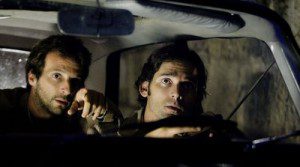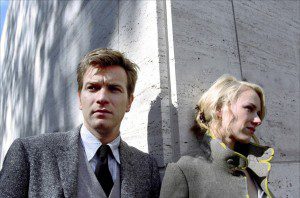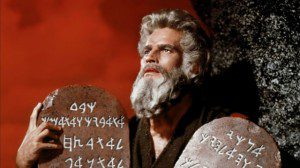 Munich takes place about 30 years ago, but it may be the most urgent film Steven Spielberg has ever made. While Spielberg has made a few historical movies before, so far they have all concerned events that took place well before he was born, and it doesn’t exactly require a whole lot of courage these days to say that slavery and the Holocaust were wrong. Munich, on the other hand, is the first to depict an event that occurred during Spielberg’s own lifetime, the ramifications of which are still being felt, and debated, today.
Munich takes place about 30 years ago, but it may be the most urgent film Steven Spielberg has ever made. While Spielberg has made a few historical movies before, so far they have all concerned events that took place well before he was born, and it doesn’t exactly require a whole lot of courage these days to say that slavery and the Holocaust were wrong. Munich, on the other hand, is the first to depict an event that occurred during Spielberg’s own lifetime, the ramifications of which are still being felt, and debated, today.
The film begins in September 1972, when Palestinian terrorists captured and murdered eleven Israeli athletes at the Summer Olympics in Munich, Germany. The initial violence as the terrorists break into the athletes’ suites is blunt, and brutal. And when the authorities respond, they screw up royally; among other things, they have to call off a rescue mission when it turns out the movements of their snipers have been broadcast on TV, where the terrorists can see everything. In one scene, Spielberg puts his camera inside the room as a terrorist steps out onto a balcony, his image transmitted to a TV nearby the door — and there is a palpable tension between the archival video footage and the actor re-enacting it off to the side, just as there is a tension between our knowledge of what will happen and our hope that things might turn out differently (between fate and free will, as it were).
The bulk of the film, however, takes place after the Olympics, when the Israeli government responds to the incident by sending a counter-terrorist team to Europe and other points around the Mediterranean to find and execute 11 Palestinian leaders. The film is based on George Jonas’s book Vengeance — previously filmed in 1986 as the TV-movie Sword of Gideon — and it follows a Mossad agent known only as Avner (Eric Bana) as he leads four fellow agents on a mission that, ironically, requires them to think and act a little like terrorists themselves. Jonas’s book, which relies heavily on Avner’s memories of events that took place a decade or more before, has been the focus of much controversy itself, and it is beyond the scope of this review to say how accurate it is. For now, suffice to say that the screenplay, by playwright Tony Kushner (Angels in America), follows it fairly closely.
The mission begins when Avner, an agent with a pregnant wife, is summoned to the home of Israeli Prime Minister Golda Meir (Lynn Cohen) and introduced to Ephraim (Geoffrey Rush), the Mossad chief who trains him and puts his team together. (Interestingly, Jonas’s book claims that the current prime minister, Ariel Sharon, was also present at this meeting and a “hero” to Avner, but unless my ears blinked, the film leaves him out of this scene.) Avner is told he will have to resign from the agency, to become “officially unofficial,” and he will have to leave Israel and his nascent family for months at a time, maybe even years. Despite being off the books, though, Avner will still have to produce receipts.
There is humour in details like this, and Spielberg finds other moments of tense amusement in what is otherwise a deadly serious story. In one scene, Avner and his teammates — bombs expert Robert (Amelie’s Mathieu Kassovitz), cars expert Steve (future James Bond Daniel Craig), documents expert Hans (Hanns Zischler), and clean-up man Carl (Ciarán Hinds) — find themselves sharing a safe house with some Arab terrorists, and after they get over the initial surprise, they have a small contest of wills over radio station preferences. Spielberg also deftly cranks up the tension in other scenes, like the one where a girl unexpectedly returns home to her father, just as Avner’s team is about to blow him up.
In some ways, Spielberg is less emotionally manipulative in this film than he has been in his other movies; when Avner tells his wife, “You’re the only home I’ve ever had,” Spielberg treats the moment matter-of-factly and even allows Avner’s wife to burst out laughing and call his sentiments “so corny.” But the way Spielberg systematically tweaks the events recounted in Jonas’s book does add up to a political statement of sorts. For one thing, he accentuates the collateral damage pretty much all the way through, though at least some of the earlier victims were killed rather discretely; according to Jonas, at least, the first explosion was inaudible and did not shatter any windows, contrary to what we see here. The film also downplays, perhaps even eliminates, Ephraim’s insistence that absolutely no innocent bystanders are to be injured. While Avner’s team does run into problems later on, it might have been better if Spielberg had allowed us to experience the early “successes” of the mission as successes, before moving on to the hits that went a little wrong.
The film also has a strange habit of linking sex and violence and dwelling on that link. While this element simmers in some of the early scenes, like the one where the girlfriend of one of Avner’s terrorist contacts comes on to him, it becomes more explicit later on. One subplot concerns the team’s fatal encounter with a perfumed woman (The Barbarian Invasions’ Marie-Josée Croze), and Spielberg makes a point of displaying the naked bodies of the dead (although, as per the usual double standard, the woman’s body is more clearly exposed than the man’s). Then there is the daring, climactic sequence in which Avner has sex with his wife even as he is tormented by thoughts of the Munich massacre. (Just as Private Ryan was haunted by memories of things that had actually happened to someone else, so too Avner experiences the events of Munich in flashback as though he had been there.)
This last scene reflects the way that, for some Jews at least, procreation itself has become a political act; this apparently includes Avner’s mother (Gila Almagor), who appears to have had her son not so much for his own sake but to ensure the continuation of Israel. (For Palestinians, too, birth rates can be a big deal; in Paradise Now, a taxi driver boasts about the quality of his sperm and the size of his family.) The relationship between family and politics also comes up when Avner meets Papa (Michael Lonsdale), the head of a mysterious French family that sells information to terrorists of all persuasions. Papa seems to like Avner more than his own son Louis (Mathieu Amalric), who is Avner’s main contact with the family; but, notes Papa ruefully, Avner himself is not family.
Some of the film’s critics have accused Spielberg of breaking faith, as it were, with his own people, because his film is critical of Israeli tactics. Not only does Munich question the practical use of assassination squads — Avner’s team, by bribing various terrorist contacts, actually pumps Israeli money into the terrorist network, and some of Avner’s “successes” create power vacuums that are filled by even worse villains like Carlos the Jackal — it also questions the moral justification for such squads. Carl suggests that the tactics used by the Israelis and the Palestinians may not be all that different in the end, and Robert protests that Jews are supposed to be “righteous,” instead of sinking to their enemies’ level.
These are troubling claims, since, as Jonas puts it, when counter-terrorists such as Avner and his team make a point of not targeting innocent civilians, there is as great a difference between terrorism and what they do as there is between war crimes and acts of war. But it would be wrong to say, as some have done, that the film, by raising these questions, is anti-Semitic. While the film is ambivalent on the question of whether Israel ought to exist, its critique of counter-terrorism is expressed in very Jewish terms, and the fact that it is the Jews who wrestle with their consciences actually reflects rather well on them. In contrast, the few Arab terrorists we meet never question their methods — methods which are, of course, much worse, even if the film isn’t as clear on that point as it should be.
Interestingly, Jonas, now a columnist with the National Post, is a Canadian conservative, and Spielberg is an American liberal, so the tension between these two perspectives makes Munich a good place to enter the debate over appropriate responses to terrorism. As the final scene makes very clear, the issues America is dealing with now are issues that Israel and other nations have dealt with for a long, long time; and while we may or may not agree with Spielberg’s take on the matter, it is to his credit that he has asked us to address our current concerns by taking a step back and looking at the bigger historical picture.
3 stars (out of 4)
–
Talk About It
Discussion starters
1. In a foreword to a new edition of George Jonas’s Vengeance, “Avner” writes that “An eye for an eye and a tooth for a tooth” (Exodus 21:24, Leviticus 24:20, Deuteronomy 19:21) is the exact opposite of the Golden Rule: “Do unto others what you would have them do unto you” (Matthew 7:12). Jesus also says that, instead of paying back “an eye for an eye,” we should “turn the other cheek” (Matthew 5:38-42). Why do you think both sets of commands are in the Bible? Does one trump the other? Are there ever times when we should follow Moses’ command instead of Jesus’ command? Is the “eye for an eye” principle an incitement to get revenge, or is it a limitation on the kind of justice that people sometimes seek?
2. Is vengeance ever justified? How is it similar to, or different from, justice? Is it okay to commit acts of justice even if you derive a personal feeling of vengeance from them? Do you think the counter-terrorist team is justified in what it does? What about the scene where they get revenge against the hit-woman, despite having no authorization from the Israeli authorities? Was that action justified, either tactically or morally?
3. Golda Meir says, “Every civilization finds it necessary to negotiate compromise with its own values.” Do you agree? Is compromise ever necessary? Are some values absolute? What is the relationship between faith and culture, or faith and “civilization”?
4. Compare Robert’s insistence that Jews should be “righteous” with the scene in which a German terrorist says right and wrong are merely concepts. Is Avner’s team operating out of a belief in righteousness? Or are they flirting with the German’s nihilism by compromising their belief in right and wrong? Where do the Arab terrorists belong on this spectrum?
5. Papa quotes the line in Ecclesiastes 9:11 about “time and chance” happening to us all. The author of Ecclesiastes notes that everyone dies, and because of this, he says, “Everything is meaningless.” Do you agree or disagree? Are the actions of terrorists and counter-terrorists morally equivalent, or is any form of struggle meaningless, because everyone will end up dead anyway? Why do you think Ecclesiastes is in the Bible?
6. Carl says, “I was born reluctant. If I can’t kvetch, I can’t do my job.” What sort of role does “kvetching” play in Jewish faith and culture? What sort of role, if any, should it play in Christian life? How do we balance obedience and criticism of the authorities we are under?
The Family Corner
For parents to consider
Munich is rated R for strong graphic violence, some sexual content, nudity and language. The violence is pretty graphic, including a man stabbed in the head, many shootings, and several scenes of exploding helicopters, apartments and hotel rooms. The only onscreen sexual activity is between a husband and wife, though there is also some nudity when a man and a woman are killed and their naked bodies exposed.
— A version of this review was first published at Christianity Today Movies.












